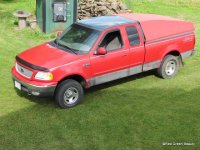Communication is bath and beyond a simple and complex process that depends on precise use to be reliable.
If you look at a Massey produced brochure or video . . you will see the GC1700 series is Tier 4 (when last I checked, Kubota BX were not). But some people communicate that "full" Tier 4 requires precipitate cannisters, dpf designation etc. etc.. Sales people and most operators don't like "full" Tier 4 requirements becsuse it adds more expense to create and maintain.
1. If you examine the statement you repeated from them . . you'll note there is some lack of precision in their answer to your question. If 30+ hp is Tier 4 and 25 hp or less is not Tier 4 . . then what is 25+ to 30 hp?
2. Technically a diesel tractor is exempt from cannister based Tier 4 requirements if it is 25.99 hp or less is my underdtanding. And they are sllowed to use engine design methods to reduce emmisions to specified levrle to achieve Tier 4 status. Anything 26.01 hp and above must use precipitate filters etc.. Thst js why (my understsnfung at least) that Mahindra's Max 28 now becsme the Max 26 by detuning the engine from 28 to 26 hp.
I am pretty sure that these engines are just detuned to meet the Tier 4 requirements for engines being 25.99 HP or less.
Pretty sure how they do it for the GC 1700 series does it to get to Tier 4.
1.) Decrease diesel injection pressure = less fuel = requires less air (read O2) to combust = less pollution, less fuel consumption, and less power
2.) High Speed Governor Reduction = Reduced to 2600 rpm for 1705/10 & 3000 rpm for 1715/20 = less fuel required = less emissions, I am sure these engines can easily rev to 3200-3500 rpm increase the output of the hydraulic pump as well
3.) Soot trapping muffler design = restrictive = increased backpressure and not a flow through setup = less power and less emissions
4.) Soot/Ash trapping oil specifications = decrease emissions
I am sure these engines could produce 28 hp all day long if it wasn't for the Tier 4 mandates if not a bit more.
Interesting little fact...
HORSEPOWER REQUIREMENTS
A practical formula for determining horsepower requirements for pumps is
as follows:
Gallons per minute x PSI Required 1714 = Horsepower.
Example: If a pump delivers 12 GPM and assuming that the required
operating pressure is 1,000 PSI.
Then multiply 12 GPM x 1,000 PSI = 12,000.
12,000 1714 = 7.0 horsepower.
Therefore, it takes 7.0 horsepower to operate the pump.
Therefore, in order for our GC 1715/20 to produce the specified 6.9 gal/min rating...
(6.9 gal/min x 1920 PRV max psi) / 1714 = 7.7 HP required to just run the hydraulics & HST on these tractors at max...

